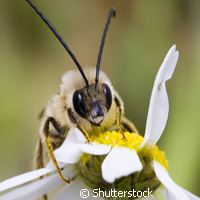How honeybees avoid toxins in flower nectar
Beekeepers have long recognised that honeybees may be susceptible to some natural plant toxins. Now scientists with the Honeybee Lab at Newcastle University in the UK have shown for the first time that serotonin - a neurochemical - plays a role in how honeybees can learn to avoid nectar containing toxins. The study, published in the Current Biology journal, showed that when bees accidentally ate nectar that made them sick, they subsequently avoided the smell of the toxic flowers. Dr Jeri Wright, Director of the Honeybee Lab, said that understanding how honeybees learn to detect these toxins could ultimately help us to breed plants that do not produce them, and in turn protect the honeybees. Bee colonies have always been vulnerable to disease because they are densely packed environments through which infections can spread rapidly. But the threats have grown in recent years. Tiny insects that feed off the bodily liquids of bees in the hive are developing resistance to the chemicals used against them. Moreover, on pollination jobs, bees come into contact with a variety of insecticides, fungicides and herbicides used on crops. While scientists do not think pesticides are the sole threat, they believe that chemicals contribute to the general decline in honeybees. 'Avoiding toxins in food is as important as obtaining nutrition,' explains Dr Wright. 'What we have shown here is that - like humans - bees are not only able to taste toxins but are also capable of learning to avoid flowers with nectar that made them feel unwell after eating it.' Honeybees have the remarkable ability to learn to associate floral cues, like flower colour and odour, with food rewards. Research at the Honeybee Lab revealed that they are learning to avoid the 'toxic nectar' through taste or learning after the 'toxin nectar' had been eaten. The latter was previously believed to be a characteristic of higher vertebrates. The honeybee's brain is estimated to contain less than 1 million neurons, making scientific investigations of the way that it learns much more tractable than in higher vertebrates with larger and more complex brains. But surely all that bees do is make honey? Far from it. They certainly do make honey, but more importantly, they are an essential agent of pollination for a vast range of plants. Without the presence of bees, much of agriculture would be impossible, and this is a sobering thought right now, as the feeding of the world is suddenly becoming more difficult. Most of the pollination for more than 90 commercial crops grown throughout Europe is provided by Apis mellifera carnica, the honeybee. Specifically, in the UK alone, pollination by honeybees of a suite of just 10 crops, ranging from apples and pears to oilseed rape, was calculated to be worth GBP 165 million (around EUR 195 million) per annum in 2007. 'The problem is that [...] bees could be feeding on "toxic nectar" because there is little else around - for example, in a large orchard where they have been brought in specially to pollinate it,' Dr Wright says. 'At a time when populations are already vulnerable and under stress, this could be crucial to their survival. It makes absolutely no sense for plants to poison the pollinators they rely on for their survival. It may be the toxins are there to protect the plants against nectar robbery by ants - we just don't know,' she adds. 'What we do know is there are a number of plant species in the UK which produce toxin-laden nectar but if there is little else around it seems the honeybees are being forced to continue to feed from these plants. This could well be having a major impact on the UK's honeybees and we need to understand this if we are going to protect them.' Consequently, the Honeybee Lab researchers now plan to determine how the consumption of 'toxic nectar' influences colony health in agricultural settings. Researchers from France and the US participated in this study as well.
Countries
France, United Kingdom, United States



